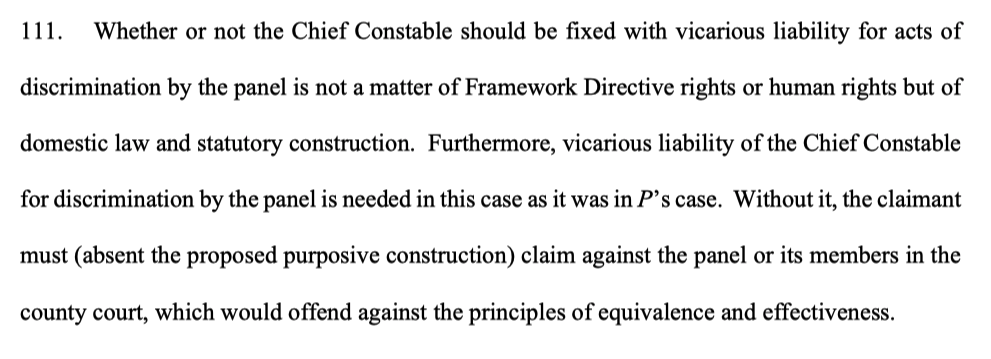
1/ Chief Constable of Avon & Somerset v Eckland - Who should the respondent be to a police officer's disability discrim claim against disciplinary decisions taken by the Independent Office for Police Conduct & a police misconduct tribunal? #ukemplaw assets.publishing.service.gov.uk/media/606c439d…
2/ The disciplinary process emanated from allegations E lied in evidence at a Crown Court, wrongly saying he visited a mortuary. The Ch. Const appointed the misconduct panel, who found E should be dismissed for gross misconduct. E appealed that decision but withdrew the appeal.
3/ E brought disability discrim claims solely against the Ch. Const reliant on depression & anxiety and events during his service & on dismissal. The claims against the Ch. Const included claims holding him liable for actions of the IOPC & the misconduct panel.
4/ The ET determined as a preliminary issue that C was entitled to bring those claims against the Ch. Const. On this appeal, E conceded the Ch. Const wasn't liable for discriminatory conduct by the IOPC & the ET had erred in finding he was. 

5/ That left open to the EAT the question of how a claim is brought against the IOPC. Kerr J accepted the ET to be a more natural forum than the county court or (heaven forfend) admin court, & that such claim could be brought reliant on EqA ss.109-112's ancillary liabilities. 

6/ In reaching that position, Kerr J made clear that he was not deciding whether a standalone discrimination claim could be brought against the IOPC in the ET rather than the county court in the absence of a primary claim against a chief constable & reliance on the ancillaries. 

7/ Whilst it appeared clear from analogy with the Supreme Court's judgment in P v MPC that s.109's agency relationship didn't apply, Kerr J was not ruling out 1 of the other ancillary bases on a properly pleaded case. 

8/ Moving on to the Ch. Const's liability for the misconduct panel, the EAT rejected some brilliantly constructed (& on their face attractive) arguments as to why the Ch. Const ought not to be liable. I can't do the arguments justice on Twitter but a couple of highlights follow.
9/ (i) The Ch Const was powerless to stop discrim by a misconduct panel & statutorily bound to implement their decision, even if discriminatory & thus unlawful. To make him liable in the ET & not them would immunise the discriminatory & penalise the non-discriminator.
10/ (ii) The panel had to be Art 6 ECHR compliant whilst the appellate tribunal from its decision, the Police Appeals Tribunal didn't. It couldn't revisit the facts & hence couldn't cure an Art 6 defect. This distinguished this situation from P v MPC where Art 6 played no part.
11/ As a result (if I follow correctly), the vicarious liability in P v MPC didn't apply & the only effective way to cure any Art 6 defect was to bring a claim directly against the panel, whether that had to be in the ET or the county court.
12/ E's response was that P v MPC applied, attributing to a chief constable the actions of a misconduct panel. Art 6 was inapplicable to E's case, a red herring & not a matter appropriate for the Ch. Const to worry about on E's behalf.
13/ Moreover, E countered the Ch. Const's powerlessness assertions by noting the possibility of bringing a JR against a recalcitrant misconduct panel exposing the Chief to a discrimination claim.
14/ E's counsel also ran Art 14 (with Art 6) 'other status' argument on account that it would put police officers at a disadvantage in respect of compliance with Art 6 rights relating to determining their civil rights to exercise their profession.
15/ The EAT sided with E & upheld the ET's decision on this point. He rejected any possibility of E having to bring his claims in 2 jurisdictions against 2 respondents/defendants as being a breach of Framework Directive rights vis-a-vis the EU principle of effectiveness.
16/ A purposive construction of EqA s.42 could treat holding office as a constable as employment by those conducting a misconduct hearing so that Framework Directive rights could be asserted against a Ch. Const as liable for the panel's discrimination. 

17/ It was necessary for the Ch Const to be vicariously liable for the misconduct panel in the same way as in P v MPC, as otherwise the EU principles of effectiveness & equivalence would be offended against by requiring claims against the panel members in the county court. 

18/ Finally, the EAT moved on to the most important and fundamental ground of appeal you're likely to see this year. Is it an error of law for an EJ to copy and paste @MilsomChr's skeleton argument? Here's a table of the similarities! 

19/ To my mind it's a pretty sensible approach for an EJ to take, but the EAT found it showed a lack of even handedness - adopting one side's case & rejecting the other side's wasn't reasoned adjudication. However, the EAT held it had no bearing on the appeal so nobody need worry
20/ It looks as if the EAT's position on the Chief Constable's vicarious liability for misconduct panels will go further, perhaps even with a case to leapfrog given that the CA may feel hamstrung by P v MPC.
21/ Personally I think @MilsomChr should get his client to appeal against the finding that it's an error of law for an EJ to adopt his skeleton, but that may offend against the rule of thumb not to get a client to appeal on a point only of interest to counsel! #ukemplaw
• • •
Missing some Tweet in this thread? You can try to
force a refresh








